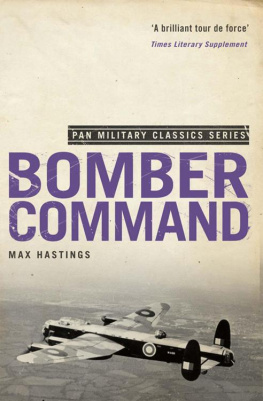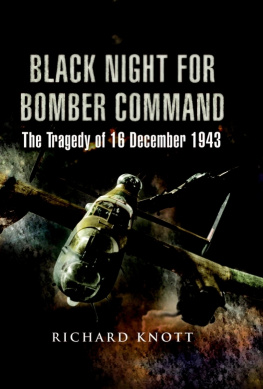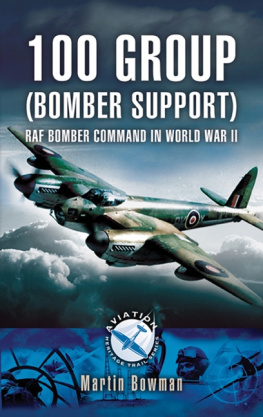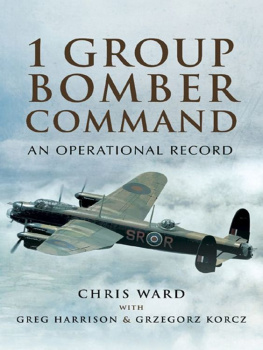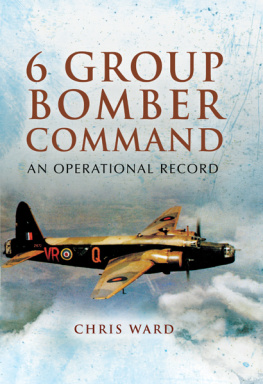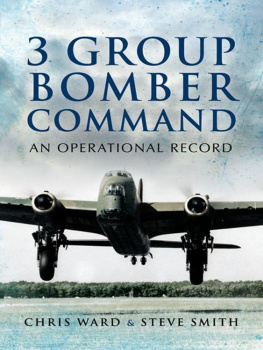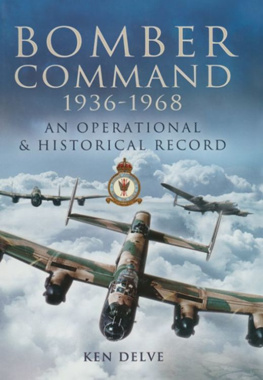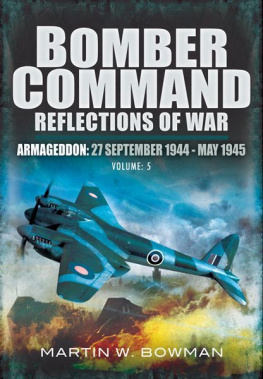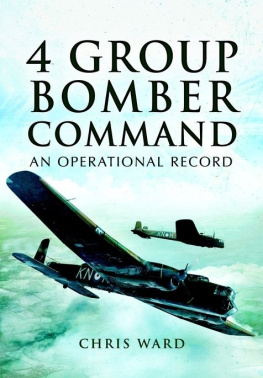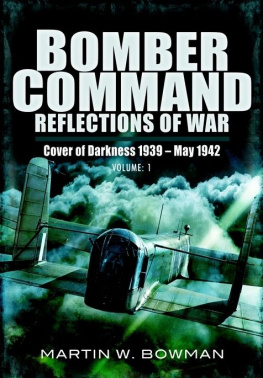Bomber Command
Here you can read online Bomber Command full text of the book (entire story) in english for free. Download pdf and epub, get meaning, cover and reviews about this ebook. publisher: Pan Macmillan, genre: History. Description of the work, (preface) as well as reviews are available. Best literature library LitArk.com created for fans of good reading and offers a wide selection of genres:
Romance novel
Science fiction
Adventure
Detective
Science
History
Home and family
Prose
Art
Politics
Computer
Non-fiction
Religion
Business
Children
Humor
Choose a favorite category and find really read worthwhile books. Enjoy immersion in the world of imagination, feel the emotions of the characters or learn something new for yourself, make an fascinating discovery.
Bomber Command: summary, description and annotation
We offer to read an annotation, description, summary or preface (depends on what the author of the book "Bomber Command" wrote himself). If you haven't found the necessary information about the book — write in the comments, we will try to find it.
Unknown: author's other books
Who wrote Bomber Command? Find out the surname, the name of the author of the book and a list of all author's works by series.
Bomber Command — read online for free the complete book (whole text) full work
Below is the text of the book, divided by pages. System saving the place of the last page read, allows you to conveniently read the book "Bomber Command" online for free, without having to search again every time where you left off. Put a bookmark, and you can go to the page where you finished reading at any time.
Font size:
Interval:
Bookmark:

For Charles,
who will one day be as moved as I am
How can I live among this gentle
obsolescent breed of heroes, and not weep?
Unicorns, almost,
for they are fading into two legends
in which their stupidity and chivalry
are celebrated. Each, fool and hero, will be an
immortal.
Keith Douglas, 1943
Bomber Commands offensive against Germany in the Second World War was one of the most remarkable passages of arms in history. It began when Winston Churchill could see no other road to victory, as England stood alone in 1940. It was undertaken with almost messianic fervour by a generation of senior airmen determined to prove that strategic air power could make a unique and decisive contribution to war. It ended in a controversy, moral and strategic, which has been raging ever since.
The cost was very high. 55,573 aircrew, almost all officers and NCOs, among the finest and most highly trained material in the British Empire, were killed. A further 9,784 were shot down and taken prisoner. The sacrifice was greater than the British Armys total loss of officers in the First World War. Bomber Commands casualties amounted to almost one-seventh of all British deaths in action by land, sea and air from 1939 to 1945. The pitiful prospects of surviving a tour of bomber operations were only matched in hazard on either side by the German U-boat crews. Germanys losses in the bomber offensive were also awe-inspiring. All statistical estimates are unreliable, but somewhere between 300,000 and 600,000 people, most of them civilians, were killed by the bombs of the RAF and the USAAF. A further five million were de-housed. By 1945 the major city centres of the Third Reich had been razed to rubble.
But was this decisive in making possible Allied victory, as leading airmen have claimed ever since, or merely catastrophic , as that very perceptive scientific civil servant Sir Henry Tizard feared would prove to be the case, as far back as 1942?
In his post-war memoirs, Bomber Commands C-in-C Sir Arthur Harris argued that in spite of all that happened at Hamburg, bombing proved a comparatively humane method. For one thing, it saved the flower of the youth of this country and of our Allies from being mown down by the military in the field, as it was in Flanders in the war of 191418.
Harriss claim deserves the most careful consideration from a Western Allied point of view, if not for the reasons that he himself would advance. The Second World War cost Britain 400,000 dead, America 300,000. It cost Germany at least 5,000,000, Russia at least 20,000,000. If there had been no bomber offensive from 1941 to 1944, while Germany was being reduced in the terrible war of attrition in the east, would it have been possible for the Allies to justify the interminable delay before opening the Second Front in Europe? Would it also have been possible to avoid the enormous casualties that would have followed a D-Day in 1943?
It is unlikely that important new evidence will be found about the nature of what was done to Germany by the bomber offensive. Each generation of historians can only seek to reinterpret the post-war reports of the American and British bombing survey units, and the testimony of vital witnesses such as Albert Speer. But there is a succession of fascinating, interwoven questions that still surround Bomber Command: beyond what was done, why was it done? How was it done? What was it like to do it? What was it like to be a victim of it? I have tried to examine all these aspects, chiefly with the help of firsthand accounts from those who took part. It is a decade since the last significant book on the bomber offensive appeared, and in the interval all the relevant official files have at last been released for public scrutiny; and the Speer memoirs and other important studies have been published.
This is not the comprehensive story of the offensive, for it deals only incidentally with the American contribution. Nor is it an exhaustive account of everything that was done by Bomber Command, for which it is necessary to turn to the four volumes of the Official History, published almost twenty years ago. I have omitted or dealt very briefly with legendary episodes, such as the Dambusters Raid, which have been fully described in the past. Instead, I have pieced together some less widely known epics of courage and endurance. I have tried to look at the key issues of the offensive as they appeared at the time, with generous use of contemporary material, much of it hitherto unpublished. Thirty-five years after the event, I think that most mens memories have gained in frankness what they have lost in precision. The mood of almost childlike bravado in some of the war stories published in the 1950s has faded.
Because Bomber Commands losses were so terrible, those who survived have always been specially sensitive to criticism of the campaign. Yet only a charlatan would seek to entangle the men who flew the aircraft in the strategic controversy. Even one of the most cynical critics of the air force, Professor D. C. Watt, has written in his essay The R.A.F. View of History: We do not think less of Leonidass three hundred Spartans at Thermopylae because, reviewed objectively, their deaths had little effect one way or another on the Persian invasion of Greece.
As far as possible in this book, I have separated the story of the aircrew from that of the struggle in Whitehall, Washington and High Wycombe. It is impossible to describe everything that every unit did, because Bomber Command was an enormous organization, so I have chosen six more or less typical line squadrons, whose experience illustrates the nature of the bomber offensive at various stages, and examined their men and their operations in some detail. Through their stories, it may become possible to understand something of what it was like to fly in the darkness over Germany.
I have quoted extensively from unpublished letters, diaries and manuscripts, and interviewed almost a hundred former aircrew, together with many former senior officers and civil servants. Each section of my draft manuscript was read by a former officer who took part in the events described. This is no protection against error, and indeed some senior officers concerned took the strongest exception to my judgements and comments. But it was intended at least to ensure that I clearly understood the Service view of what took place.
At the strategic level, I must express my deep gratitude to the former Commander-in-Chief of Bomber Command, Sir Arthur Harris; to his former Group commanders, Air Vice-Marshal Donald Bennett, the late Air Chief Marshal Sir Ralph Cochrane, and Air Vice-Marshal E. B. Addison; and to the former Director of Bomber Operations at the Air Ministry, Air Vice-Marshal S. O. Bufton. These are only the most prominent of the distinguished airmen who have given me time and help. They will find much to disagree with in what I have written, but I hope that they will accept that I have tried honestly to review their achievements, recognizing the extraordinary conditions and difficulties amidst which they fought.
As for those who flew, it was deeply moving to sit through long evenings in suburban bungalows, listening to very ordinary middle-aged men describing the quite extraordinary things that they did as young aircrew over Germany. I am grateful that my generation has been spared the need to discover whether we could match the impossible sacrifices that they made.
Max Hastings
Jerpoint House
Co. Kilkenny
January 1979
Font size:
Interval:
Bookmark:
Similar books «Bomber Command»
Look at similar books to Bomber Command. We have selected literature similar in name and meaning in the hope of providing readers with more options to find new, interesting, not yet read works.
Discussion, reviews of the book Bomber Command and just readers' own opinions. Leave your comments, write what you think about the work, its meaning or the main characters. Specify what exactly you liked and what you didn't like, and why you think so.

